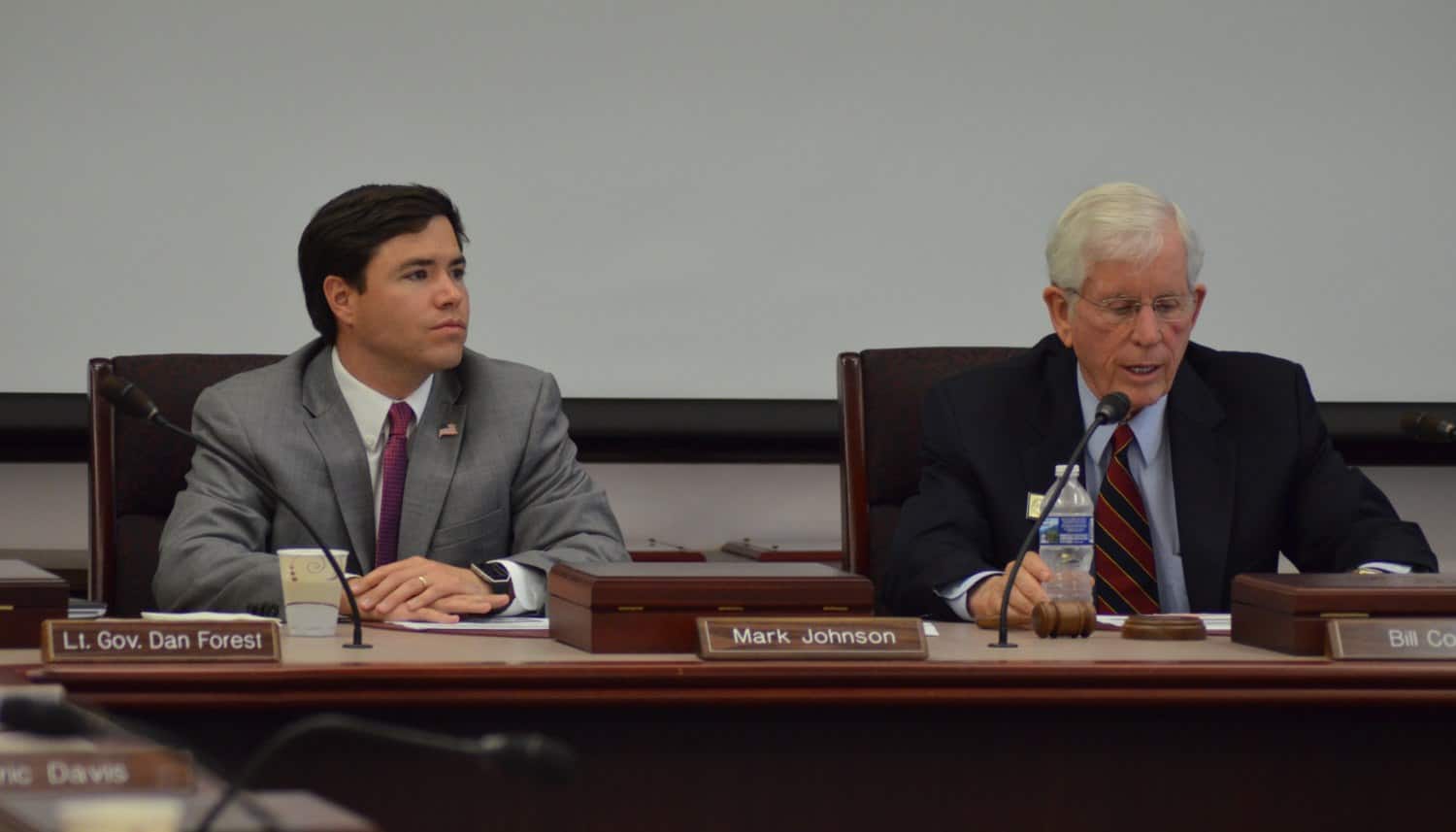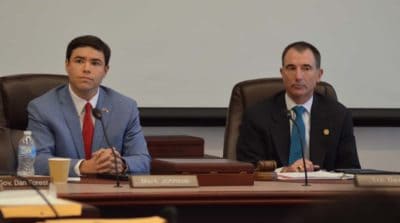The State Board of Education met for three days this week and, in a surprise move, granted Superintendent Mark Johnson the ability to hire his own chief of staff.
The vacancy was a point of contention between Johnson and the board. During the December special session of the General Assembly, legislation was passed granting Johnson certain powers that previously belonged to the State Board. That transfer was halted while a lawsuit addresses the matter. One of the powers Johnson gains, should the legislature’s move stand, pertains to who he can hire and fire. Currently, he is able to give input on some hires but the State Board has the final say. That included, until today, his chief of staff.
Johnson has remarked many times about his frustration at not being able to hire a chief of staff. At the recent Education Cabinet meeting, he joked when introducing his staff by saying that maybe one day he would have a chief of staff.
The board also named Maria Pitre-Martin as the new deputy state superintendent. She previously served as chief academic and digital learning officer. She succeeds Rebecca Garland.
The board also created a new position: chief district and school support officer, though details on the position’s duties are not yet clear.
Bertie’s financial floundering
Bertie County was the subject of a report during the State Board meeting this week. The Bertie County school district is in the midst of severe economic difficulties, requiring the intervention of the state. Among its problems, the district has an approximately $700,000 deficit in its general fund and a deficit of about $135,000 in its restricted fund. The state also found a “lack of financial management and oversight resulting in specific general statutes being violated.”
The state required the county to create a “financial recovery plan,” which will get rid of the deficit, establish better financial and reporting systems, and ensure that the district complies with the law.
The district has five years to make a turnaround and has already taken some steps on the road to recovery, including replacing the superintendent and finance officer for the district.
The recovery plan was discussed this month, but will be voted on by the board next month.
Better process at Charter School Advisory Board
The State Board heard from the head of the Charter School Advisory Board (CSAB) about schools scheduled for recommendations to receive charters from the state. CSAB board chair Alex Quigley told the board that 15 applicants were recommended. He added that all but three of those were a unanimous vote on the part of the CSAB. Additionally, the CSAB declined to move forward with 19 other applicants.
Quigley took care to note the unanimous votes and the denials. He told the board that a new process for evaluating applicants is working well.
He said that one change the CSAB made was to revamp the applicant interview process so board members can get clarification and more information. This has led to more agreement, he said.
“I think you’ll notice even in the actual votes, you’ll see more alignment among board members,” he said.
State Board of Education member Becky Taylor said the CSAB process was looking better.
“Each one of these board members are looking for quality, which is what we want,” she said.
There has been tension between the CSAB and State Board since August when the State Board rejected five applicants recommended by the CSAB on split votes. The decision led to a written protest from CSAB members.
The State Board heard information about the15 applicants CSAB recommended this week but will not vote on them until next month.
Restart schools
The State Board also the adoption of the restart model by 42 schools. Schools who receive a “low-performing” assessment may apply for the status which gives them charter-like flexibility.
These applicants are the latest in a long line of schools seeking to improve education by adopting the model. Board member Taylor said interest in restart status was positive.
“I think we were all pretty excited about how aggressive our systems are in taking part in this,” said Taylor.
School Performance Grades
During a legislative update at the State Board on Thursday, a few board members argued over the proper way to calculate school performance grades.
Currently, grades are determined using a formula that combines 80 percent academic achievement and 20 percent academic growth. House Bill 322, which passed the House but is waiting to be heard in the Senate, would move that ratio to a 50/50 split. Board member Olivia Oxendine said the 50/50 split was too relaxed.
“About 60 percent of American-Indian students in my region are not reading on grade level,” she said. “That’s pretty dramatic.”
Board member Greg Alcorn responded, saying that every superintendent he talks to wants the 50/50 split.
“I appreciate that,” Oxendine replied. “But I’m voicing one opinion on the State Board.”
Bobbie Cavnar, North Carolina Teacher of the Year and advisor to the board, said the meaning of achievement scores is sometimes up for debate. He said that academic growth measures the actual learning that takes place in the classroom and the efficacy of a teacher, whereas achievement is influenced by a host of factors, including a student’s life outside of school.
“When we grade teachers and teachers’ work, we have to look at growth,” he said. “We have to understand how important growth is to what teachers do everyday.”
State Board Chair Bill Cobey said in an interview earlier in the week that the Board is generally lined up in support for the 50/50 split.
Read this explainer on school performance grades for more about how they are devised and the meaning of academic growth and achievement.
Every Student Succeeds Act
On Tuesday, the State Board met with superintendents from around the state to hash out issues related to the federal Every Student Succeeds Act. The state is currently working on a plan to align the state with the requirements of the act. One of the most notable aspects of ESSA is that it grants more freedom to the state than prior federal education programs granted.
The state also released a draft of its ESSA plan. See it here.




